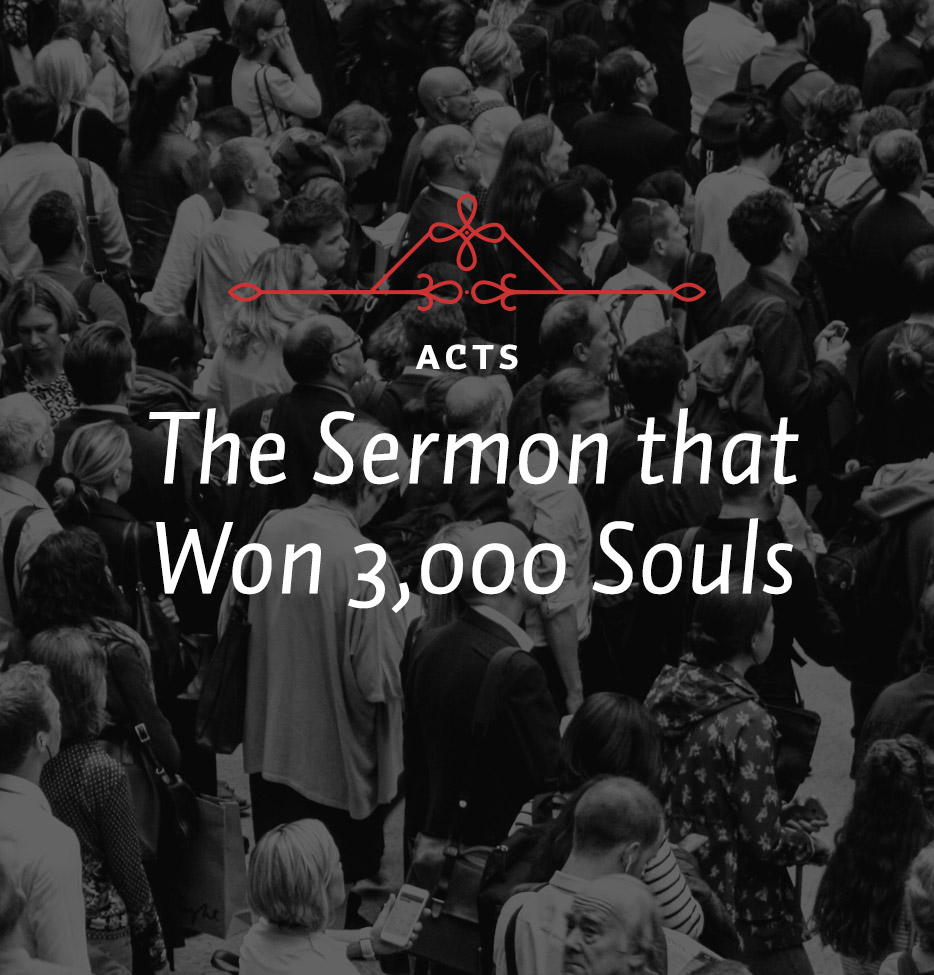It is interesting to notice what Peter had to say about Jesus. This part of the sermon begins at verse 22, after he has cited the text about Pentecost, and it continues to nearly the end. What is missing in these words, that we might have expected Peter as one who had accompanied Jesus through the three years of his active earthly ministry to have included, is Christ’s teachings. We might have expected Peter to have said, “The Lord Jesus Christ taught this or that or this other thing.” But Peter does not do it. He does not include the teachings.
Do not misunderstand me. It is not that the teachings of Jesus Christ are unimportant. Certainly they are. That is why we have the Gospels. The teachings of Jesus are recorded for our benefit. But here Peter is preaching to men and women who were not believers in Jesus Christ—to men and women who, apart from the work of the Holy Spirit, were dead in their sins—and he knew that no one can preach successfully to spiritually dead people, saying, “Do what Jesus tells you.” They cannot do it. Not only that, they do not even want to. People like this had crucified Jesus because they did not like what He was teaching. So Peter does not tell them what Jesus said, but instead declares what Jesus did for them. He preaches the cross and resurrection.
We need more of this in our churches. Many churches are filled with well-meaning people who share what Jesus says and somehow expect those who are not born again to follow it. They cannot. Instead, we need to preach first that God sent Jesus to die for our sins and to call men and women to faith in Him. We need to declare that those who trust Him will find salvation from their sins and new life by the Holy Spirit.
It is interesting to note the doctrines concerning Christ’s work that Peter manages to squeeze in, in just these few verses:
1. His ministry. This is described, not as a ministry of teaching but as a ministry of miracles or signs, the point being that God accredited Him by them.
2. The crucifixion. Peter emphasized that this was by the express plan and foreknowledge of God, that is, that it was no accident. He also said that those who were responsible for it were guilty of the sin.
3. The burial. Peter contrasts it with David’s burial, which was permanent. Jesus’ burial was real but temporary.
4. The resurrection. Peter deals with the resurrection at greatest length, quoting Psalm 16:8-11 and then expounding upon it in verses 29-32.
5. His ascension. This links the work of Christ to Pentecost, that is, to what was then the present time. It is from His present position with the Father that Jesus “has poured out what you now see and hear” (v. 33).
6. Christ’s present ministry. Pentecost is proof that Jesus Christ is still working.
This is the heart of all the apostolic preaching. A number of years ago, a scholar in England by the name of C. H. Dodd wrote a book called The Apostolic Preaching and Its Developments,in which he pointed out that there is a certain core of “proclamation” facts that were almost always used by the early preachers. Dodd and others called this the kerygma, using the Greek term for “proclamation.”1
We find this kerygma throughout the New Testament. Here is one example. Paul, when he was writing to the church at Corinth, said, “What I received I passed on to you as of first importance: that Christ died for our sins according to the Scriptures, that he was buried, that he was raised on the third day according to the Scriptures, and that he appeared to Peter, and then to the Twelve. After that, he appeared to more than five hundred brothers at the same time, most of whom are still living, though some have fallen asleep” (1 Cor. 15:3-6). Do you see what Paul is doing? He is doing here, many years after Pentecost, precisely what Peter did when he preached so powerfully on that earlier occasion. He is listing the basic Gospel facts.
When I think about this, I cannot help but reflect on the sad state of so much Christian preaching and witnessing in our time. The problem with our preaching today is that it is so man-centered. Sometimes this is centered on the preacher. The minister will tell cute stories, often about himself or his children. (One of the things I determined when I came to Tenth Presbyterian Church as its pastor nearly thirty years ago was never tell stories about my children. I don’t know if they appreciated it. But they will, and perhaps they already do.) Sometimes the preaching is centered on the hearers. It speaks to “felt needs.” There is a certain sense in which that may be quite proper, of course. It is possible to reach people by speaking to their felt needs. But much preaching never gets beyond that. It is psychological or sociological in emphasis. It looks to the polls and asks, “What produces the maximum results? What best builds a big congregation?” That may succeed as the world measures success. You can build a big congregation with the same technique you use to build a big corporation or market hamburgers. But that is quite different from doing the work of God.
1C. H. Dodd, The Apostolic Preaching and Its Developments (New York: Harper & Brothers, 1935).






